Imagine living next door to a hotel for months, only to find out it’s not welcoming tourists—but housing dozens of asylum seekers under a veil of secrecy.
That’s what’s happening across the UK, and it’s sparking serious debate over transparency, public safety, and the right to know what’s happening in one’s own neighborhood.
Local Communities Left in the Dark
It’s recently come to light that many migrant hotels are being kept under wraps—not for security, but under the pretext of protecting residents’ privacy.
Local councils, backed by the Home Office, are refusing to disclose which hotels are being used for asylum seekers, citing data protection laws.
The goal, they say, is to shield vulnerable people.
But critics argue it’s also shielding the government from accountability.
In Newcastle, for instance, city officials claimed they were legally prevented from telling residents when a hotel near them was converted into migrant housing.
Tower Hamlets council took a similar stance, saying there’s no obligation to make such information public.
Shocking Crime Figures Raise Alarms
While privacy concerns dominate the official narrative, another troubling layer is unfolding.
A recent investigation by The Mail on Sunday found that out of just 70 migrant hotels surveyed—a fraction of the total in use—more than 300 asylum seekers were charged with over 700 offences.
These included serious crimes such as rape, assault, and theft.
One hotel in particular, the Thistle City Barbican in central London, reportedly saw 41 of its residents charged with 90 criminal offences over a three-year span.
Adult Content Filmed Inside Hotel Rooms
In one jaw-dropping account, a former hotel manager shared how he stumbled upon a makeshift porn shoot in a guest room.
The incident took place at the historic Metropole Hotel in Blackpool and involved a male Syrian asylum seeker and a female migrant.
According to the manager, they had set up a camera, used various props, and admitted to producing content for the OnlyFans platform to earn cash.
Rather than taking legal action, the response was simply to relocate the man to another hotel—raising questions about how misconduct is being handled behind the scenes.
Public Protests and Tensions Escalate
These revelations come as communities across the country grow increasingly anxious.
Last year, several asylum accommodations were targeted by mobs, including violent threats to set buildings on fire, particularly following a high-profile murder case in Southport involving three young girls.
Just this past weekend, over 100 demonstrators gathered outside a migrant hotel in Epping, Essex, reigniting concerns about safety and transparency.
Billions Spent, Billions Earned
The government’s hotel strategy is a costly one. Currently, over 32,000 asylum seekers are housed in hotels at the expense of British taxpayers.
Another 66,000 live in private flats and houses.
The three main firms contracted to handle this—Serco, Mears, and Clearsprings—have reportedly pocketed nearly £383 million in profits since 2019.
Despite this enormous spend, critics argue there’s little oversight and even less transparency on how these operations are being run—or mismanaged.
Government Defends Policy, Critics Say It’s Not Enough
The Home Office insists that most asylum seekers follow the rules and that any form of antisocial behavior or illegal activity is dealt with by cutting support or moving individuals.
“Contractors are expected to report all breaches immediately,” a spokesperson said.
But that’s not enough for some politicians.
Shadow Home Secretary Chris Philp slammed the system, calling the hotels “dens of criminality and depravity” and accusing current Home Secretary Yvette Cooper of mismanaging taxpayer money.
What Comes Next?
With rising public unease, mounting crime stats, and secretive policies, pressure is building on the government to rethink how it houses asylum seekers—and how it communicates with communities.
Whether this leads to real reform or more behind-the-scenes maneuvering remains to be seen.
